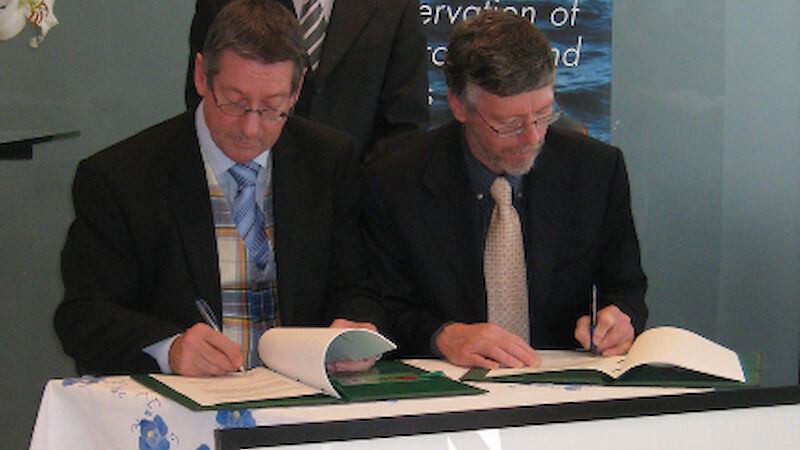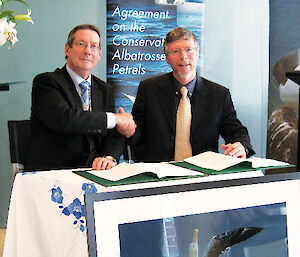Hobart, Australia is now officially home to the Secretariat for the Agreement on the Conservation of Albatrosses and Petrels (ACAP).
The historic Headquarters Agreement for the Conservation of Albatrosses and Petrels was signed today in Hobart by the Director of the Australian Antarctic Division, Dr Tony Press and the Executive Secretary of the ACAP Secretariat, Mr Warren Papworth.
The Headquarters Agreement is the culmination of negotiations between the Government of Australia and other Parties to ACAP to establish the Secretariat in Hobart. The Agreement formalises the home of the secretariat in Hobart which has been the interim host in recent years.
The Australian Government has worked closely with Tasmania to establish the Secretariat. Tasmania has a strong and long-standing commitment as a host to international Secretariats and organisations with an Antarctic or Southern Ocean focus and is recognised for its unique and thriving Antarctic sector.
Tasmania already hosts the Commission for the Conservation of Antarctic Marine Living Resources (CCAMLR), the Council of Managers of National Antarctic Programs (COMNAP) and the French Polar Institute’s southern base.
Albatrosses and petrels face many perils at sea and on land. It is in the Southern Ocean that each year, tens of thousands of albatrosses and petrels are killed — a by-product of longline fishing — where the birds are accidentally caught on hooks then drowned, mostly as the weighted lines sink.
One international forum that has achieved outstanding success in eliminating seabird mortality, thanks to the work of Australia and other countries, is CCAMLR. Over the past decade, seabird mortality in CCAMLR-managed fisheries has fallen from about 7000 per annum to zero despite increased fishing effort.
Australia has been active in pursuing seabird conservation in other regional fisheries forums too. Only last week, an Australian proposal to the Indian Ocean Tuna Commission urged the adoption of strong and mandatory measures to minimise seabird bycatch. That proposal, which was successful and will be a precedent for other tuna commissions, was first drafted here in Hobart and drew on the range of local scientific and other expertise.
The development of ACAP was an Australian initiative and has been a government priority since the mid 1990s. The other signatories to the Agreement are Argentina, Brazil, Chile, Ecuador, France, New Zealand, Norway, Peru, South Africa, Spain and the United Kingdom.
The Secretariat is responsible for promoting and coordinating activities under the ACAP Agreement, which was established in response to international recognition that albatrosses and petrels are amongst the most threatened birds in the world, with many species facing extinction.
The most significant threat facing albatrosses and petrels is mortality resulting from interactions with fishing gear, especially longline and trawl. In addition, birds may be threatened at their breeding sites by introduced predators, diseases, habitat loss, pollution and climate change.


